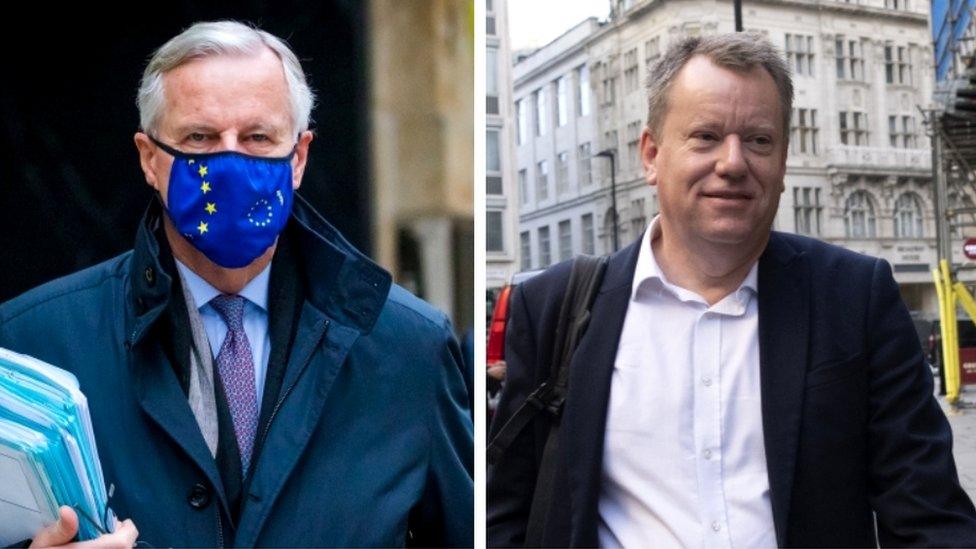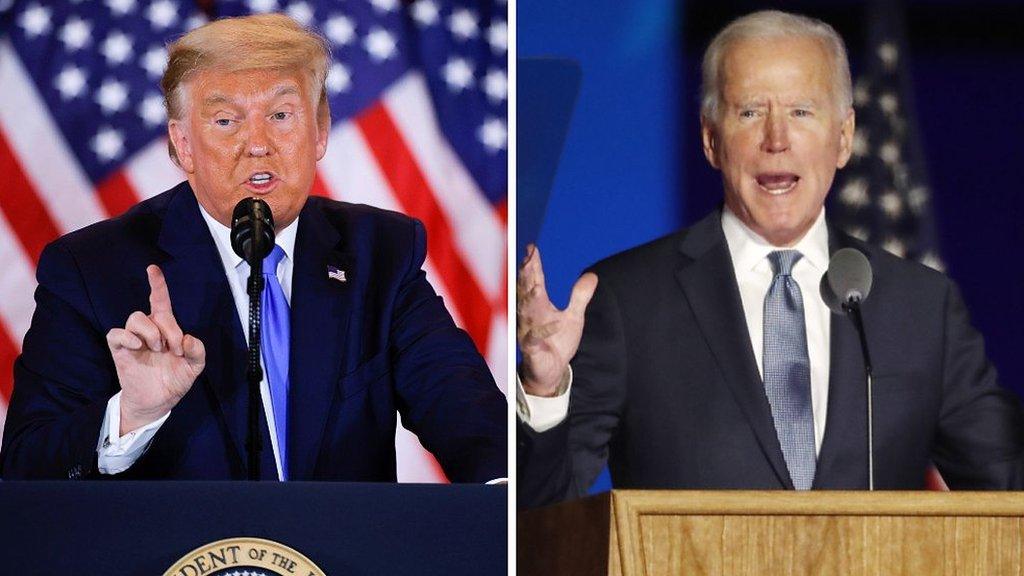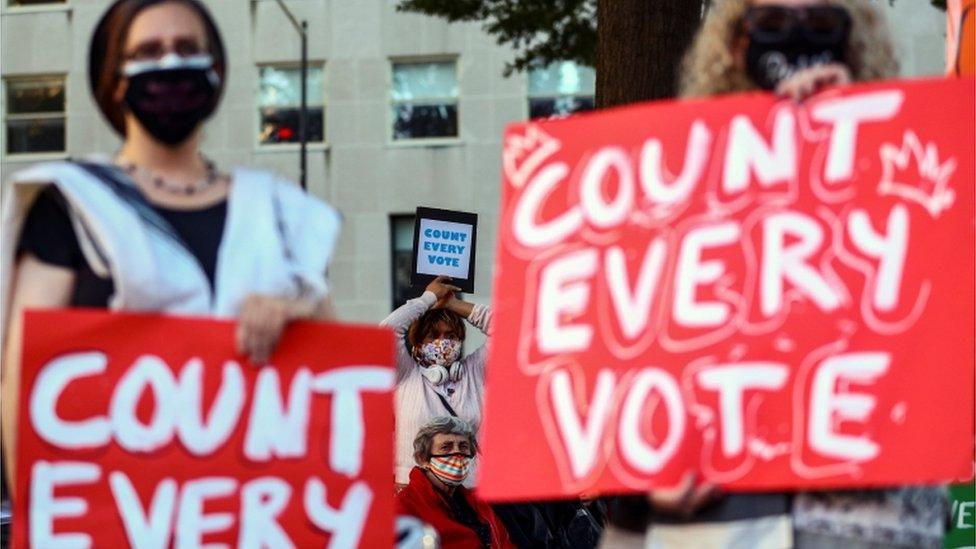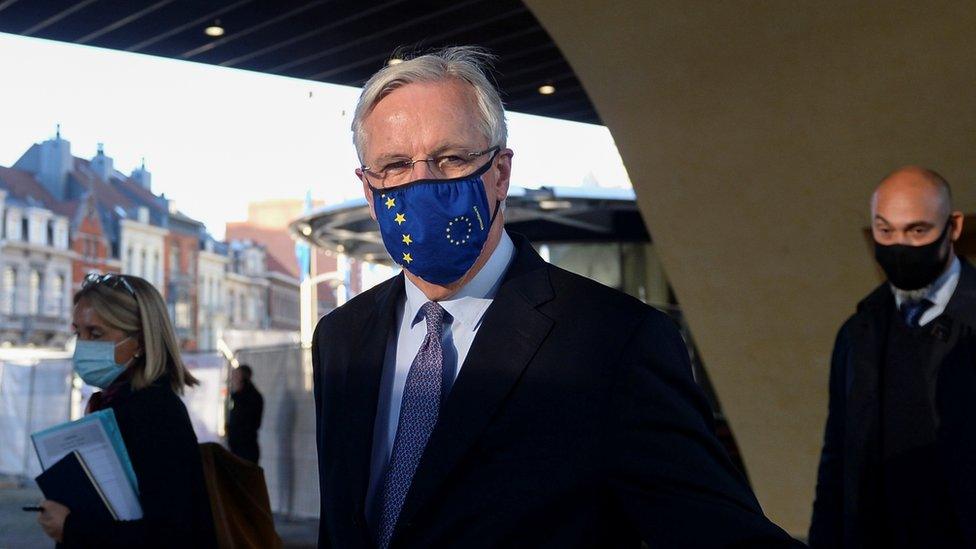Brexit talks; Has US election slowed down trade negotiations?
- Published

Michel Barnier (L) and UK counterpart David Frost have both spoken of big differences over a post-Brexit trade deal
Have the US elections really influenced Brexit talks?
Some say the UK slammed on the brakes in negotiations this week, as the government hedged its bets on who would end up in the White House.
Not so, say UK government sources.
That's not the impression we have, say EU voices close to the talks.
Trump or Biden?
Clearly, a no-deal situation with the EU would be a bit easier for the government to sell in the short term with Donald Trump in the White House. While a trade deal with the US is proving (unsurprisingly) tough for the UK to negotiate, Mr Trump could probably be relied on to make some very positive noises.

Joe Biden, unlike President Trump, has had no contact with the prime minister, warm or otherwise. Relations with the UK, while of interest, would arguably be pretty far down his list of immediate presidential priorities.
With his roots in Ireland, Mr Biden would also likely support US lawmakers who've insisted the Irish protocol contained in last year's Brexit divorce deal must be fully respected. This is because of its importance in maintaining an open border on the island of Ireland and, by extension, in safeguarding the Northern Ireland peace process.
In September, just after the UK government introduced the Internal Market Bill which had provisions to override parts of the Irish protocol, the influential Speaker in the US House of Representatives, Nancy Pelosi, said the UK could forget a trade deal with the US, if it did anything to undermine the peace process.
The UK government has defended the clauses in the Bill, calling them a safety net, but the stance of a significant section of US lawmakers is unlikely to shift with these elections.
Why did pace drop off?
Despite this, the UK insists the slow-down in negotiations with the EU this week were fully independent of the drama unfolding in the US.
Apart from anything else, the UK is not displaying signs of wanting to pursue a no-deal strategy. Of course anything is possible but, if that had been the plan, why return to the talks at all after the prime minister's very public walk-away last month?
Understanding what happened this week - as always - depends who you speak to.
No-one denies the pace of talks dropped off. Or that big gaps remain on the three naggingly outstanding points of divergence: fishing rights, competition regulations and how a trade deal would be governed.
Brussels sources point the finger of blame at the UK. They wonder aloud whether Downing Street is hedging its bets on the best, or least terrible timing to make the concessions necessary to agree this deal.
Confused by Brexit jargon? Reality Check unpacks the basics.
EU diplomats can see the difficulties Boris Johnson is already facing with his backbench MPs over a separate subject: his handling of the Covid-19 crisis.
The question in Brussels is: Is the prime minister, loath to make an uncomfortable situation unbearable, waiting to sign a deal with the EU until all backs are up against the wall, time-wise, for domestic political reasons?
"Mr Johnson is certainly not delaying because he's personally involved in haggling over herring or other fishing issues!" remarked one well-placed EU contact.
"I can't believe he can be waiting for [the EU] to cave in on competition regulations," retorted another EU insider. "He must have understood by now we're not going to leave our single market exposed. The reasons for the slow-down must lie closer to home," came another EU-insider comment.
But the UK rejects this analysis too.
'UK mandate is clear'
Sources speak instead of the "natural ebb and flow" of negotiations and insist the UK has continued to play a constructive role in talks.
"The thing is, the EU only describes negotiations as constructive when we are agreeing with them," noted one UK contact wryly. "Obviously, we're not always going to do that. The UK mandate is clear."
More from Katya:
It's important to note that trade talks have not broken down altogether this week.
They continue at a technical level on Thursday and Friday, though you could question the value of this. As I've often noted in this blog, high-level political input rather than more technical discussions are needed, to sign off on the difficult compromises required of both sides to get a deal done.
The two lead negotiators, David Frost and Michel Barnier, are expected to talk by phone, and "intensive" negotiations, including the continued drafting of joint legal texts on issues already agreed, are then scheduled to resume in London on Monday.
There's talk too of more possible contacts next week between the prime minister and European Commission President Ursula von der Leyen.
Repeatedly, the word used to describe the negotiating timetable is "fluid".
If you're looking for any kind of certainty, it's that the latest in a long, long line of Brexit deadlines - this time it was the EU saying talks had to finish by 15 November - is about to be smashed and extended.
- Published6 November 2020

- Published4 November 2020

